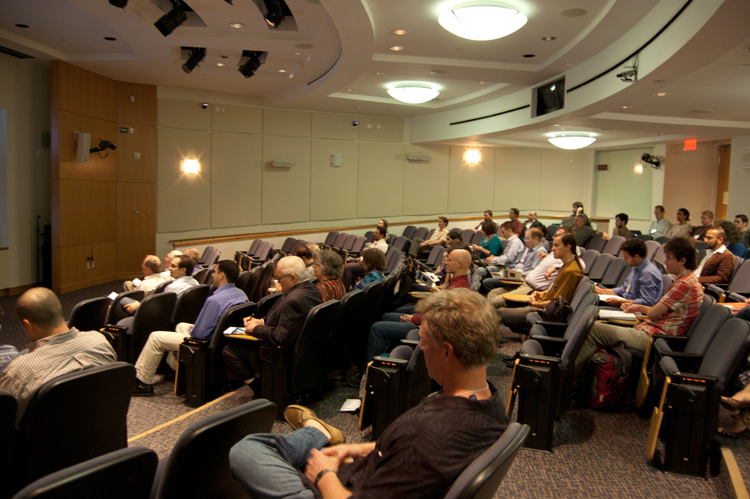 The Department of Astronomy and McDonald Observatory currently host over 20 postdoctoral fellows, conducting cutting-edge research in frontier areas spanning cosmology, galaxy formation and evolution, stellar evolution and star formation, exoplanetary systems, and the Solar system. Many of our postdocs hold prestigious postdoctoral prize fellowships, including the NASA-funded Hubble postdoctoral fellowship, National Science Foundation (NSF) postdoctoral fellowship, and the Harlan J. Smith and W. J. McDonald prize postdoctoral fellowship. Through their affiliation with UT Astronomy, our postdoctoral fellows have access to top observational and theoretical facilities, including McDonald Observatory and the Texas Advanced Computing Center (TACC), and in the future to the Giant Magellan Telescope for which UT Astronomy is a major founding partner.
The Department of Astronomy and McDonald Observatory currently host over 20 postdoctoral fellows, conducting cutting-edge research in frontier areas spanning cosmology, galaxy formation and evolution, stellar evolution and star formation, exoplanetary systems, and the Solar system. Many of our postdocs hold prestigious postdoctoral prize fellowships, including the NASA-funded Hubble postdoctoral fellowship, National Science Foundation (NSF) postdoctoral fellowship, and the Harlan J. Smith and W. J. McDonald prize postdoctoral fellowship. Through their affiliation with UT Astronomy, our postdoctoral fellows have access to top observational and theoretical facilities, including McDonald Observatory and the Texas Advanced Computing Center (TACC), and in the future to the Giant Magellan Telescope for which UT Astronomy is a major founding partner.
UT Astronomy postdocs have the opportunity to collaborate with faculty, research scientists, and graduate students, and to supervise the research of undergraduate students. They also benefit from mentoring and professional development resources from the department and College of Natural Sciences (see list below). Our postdocs also play a leading role in organizing the biennial Frank N. Bash symposium "New Horizons in Astronomy", which brings together young researchers from around the world to promote the exchange of research ideas and visions for the future of astronomy. The symposium is funded by the Department of Astronomy, McDonald Observatory, and our generous Board of Visitors.
Below are some resources and useful information for postdocs. If you have questions not addressed by the information below, please contact the postdoc representative (postdocrep@astro.as.utexas.edu) and the Chair’s office (chair@astro.as.utexas.edu).
Code of Conduct
The Astronomy program is committed to providing an educational and working environment that is free of harassment and discrimination on the basis of race, color, religion, national origin, gender, age, disability, citizenship, veteran status and sexual orientation. We expect all postdocs to adhere to this policy and to report any concerns to the Chair’s office, UT contacts on nondiscrimination-policy, and sexual harassment and misconduct.
Useful Contacts
- Astronomy Contact Info
- Departmental Research Groups
- Department Chair: Karl Gebhardt - chair@astro.as.utexas.edu
- Postdoc Representative: Ryan Endsley - postdocrep@astro.as.utexas.edu
- Astronomy Postdoc Mentoring Committee - astro_postdoc_mentoring_committee@utlists.utexas.edu
- Administrative Staff Services Directory
Please consult this list to get help for administrative requests, computing/IT requests, travel, room reservations, grant proposal preparation and submission to OSP, inviting collaborators, building issues, etc.
Introductory guide for New Postdocs
- Document being compiled by postdoc rep.
Mentoring Resources and Professional Development
- Astronomy Postdoc Mentoring Committee - astro_postdoc_mentoring_committee@utlists.utexas.edu
- Informal Astronomy Mentors for Postdocs and Grad Students
- CNS Postdoc Resources
- CNS Postdoc Professional Development and Career Support
- Association of Women in Astronomy Research and Education (AWARE)
- BeVocal: The Bystander Intervention Initiative of The University of Texas at Austin
- Women's Community Center
Funding/Research Opportunities
- Departmental Funding Opportunities
- Cox Research Funds: Call from the Chair's office in the Fall
- Frank N. Bash Symposium: New Horizons in Astronomy
- UT/CNS and Federal Funding Opportunities
- Request Co-PI or PI status
When the University accepts a grant or contract from an external sponsor, the University assumes responsibility for the proper performance of the stated project, for the fiscal management of the funds received, and for accountability to the sponsor. The institutional responsibility for meeting these obligations is vested in the PI, and the Office of Sponsored Projects sets the rules of PI and Co-PI eligibility for all University of Texas researchers.
As per these rules, postdoctoral fellows (0712) are eligible only for Co-PI status. However, this status is not conferred automatically and postdoctoral fellows interested in this option must ask the Department chair to initiate a request to OSP. This process takes time and requests are approved on an indivdual case base basis, so postdocs should contact the Chair's office at least a month before their grant proposals are due.
Resources for Advising/Mentoring Undergraduates
- Post Your UG Research Project
- Departmental Undergraduate Awards
- Undergraduate Summer Funds: Call made by UGCOM chair
Travel
- At least three weeks before you travel please file a Request for Travel Authorization or RTA and consult the Astronomy Travel Page
- The department follows UT policies on travel for travel arrangements, authorization reimbursements, and travel reimbursement rates are set by the state and the University. These rates vary based on the type of account (e.g., state accounts, state-funded accounts, local accounts) used to fund the travel.
- Postdocs can apply for a Travel Credit Card (UT EID login required) that gives a 60-days grace period (as opposed to a traditional credit card).
Inviting Research Collaborators
Other University Resources




